| Listing 1 - 10 of 25 | << page >> |
Sort by
|
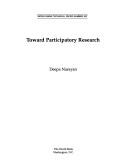
ISBN: 0821334735 Year: 1996 Publisher: Washington, D.C.
Abstract | Keywords | Export | Availability | Bookmark
 Loading...
Loading...Choose an application
- Reference Manager
- EndNote
- RefWorks (Direct export to RefWorks)
Quantitative methods in social research --- Developing countries --- Pays en développement --- Politique de l'éducation --- Educational policies --- Politique de la recherche --- Research policies --- Prise de décision --- Decision making --- Participation sociale --- Social participation --- Développement durable --- Sustainable development --- Community development --- Water resources development --- Research --- Citizen participation. --- Citizen participation --- Kwantitatieve sociologische onderzoeksmethoden --- Ontwikkelingslanden
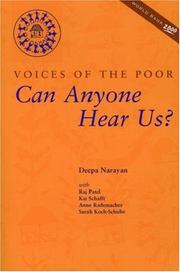
ISBN: 0195216016 9786610085972 1280085975 0585469938 9780585469935 Year: 2000 Publisher: New York Oxford university press
Abstract | Keywords | Export | Availability | Bookmark
 Loading...
Loading...Choose an application
- Reference Manager
- EndNote
- RefWorks (Direct export to RefWorks)
Social stratification --- Social problems --- Developing countries --- Eastern and Central Europe --- Poverty. --- Poor. --- Disadvantaged, Economically --- Economically disadvantaged --- Impoverished people --- Low-income people --- Pauperism --- Poor --- Poor, The --- Poor people --- Persons --- Social classes --- Poverty --- Destitution --- Wealth --- Basic needs --- Begging --- Subsistence economy --- Economic conditions --- 364.22 armoede --- 305 --- 330.564 --- 330.59 --- 364.22 --- 364.22 Armoede. Financiele problemen. Financiele nood --- Armoede. Financiele problemen. Financiele nood --- 330.59 Levensstandaard. Sociale indicatoren --- Levensstandaard. Sociale indicatoren --- 330.564 Verdeling van nationaal inkomen. Inkomensverdeling --- Verdeling van nationaal inkomen. Inkomensverdeling --- 305 Genderstudies. Rol van de sekse. Gender. Personen vanuit interdisciplinair gezichtspunt --- Genderstudies. Rol van de sekse. Gender. Personen vanuit interdisciplinair gezichtspunt
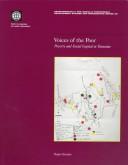
ISBN: 0821340611 Year: 1997 Publisher: Washington, D.C. The World Bank
Abstract | Keywords | Export | Availability | Bookmark
 Loading...
Loading...Choose an application
- Reference Manager
- EndNote
- RefWorks (Direct export to RefWorks)
Social problems --- Social policy --- Tanzania
Book
Year: 1999 Publisher: Washington, D.C.
Abstract | Keywords | Export | Availability | Bookmark
 Loading...
Loading...Choose an application
- Reference Manager
- EndNote
- RefWorks (Direct export to RefWorks)
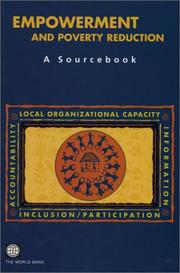
ISBN: 0821351664 Year: 2002 Publisher: Washington, D.C. World Bank
Abstract | Keywords | Export | Availability | Bookmark
 Loading...
Loading...Choose an application
- Reference Manager
- EndNote
- RefWorks (Direct export to RefWorks)
Book
ISBN: 2890353753 Year: 2004 Publisher: Montréal, Que. Editions Saint-Martin
Abstract | Keywords | Export | Availability | Bookmark
 Loading...
Loading...Choose an application
- Reference Manager
- EndNote
- RefWorks (Direct export to RefWorks)
Sociology of environment --- Community organization --- Social policy --- Development aid. Development cooperation --- World Bank --- Developing countries
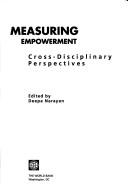
ISBN: 0821360574 0821360582 9780821360576 9780821360583 Year: 2005 Publisher: Washington, D.C. World Bank
Abstract | Keywords | Export | Availability | Bookmark
 Loading...
Loading...Choose an application
- Reference Manager
- EndNote
- RefWorks (Direct export to RefWorks)
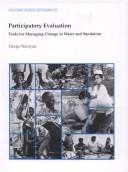
ISBN: 0821324772 Year: 1994 Publisher: Washington, D.C. Banque mondiale
Abstract | Keywords | Export | Availability | Bookmark
 Loading...
Loading...Choose an application
- Reference Manager
- EndNote
- RefWorks (Direct export to RefWorks)
Book
ISBN: 0821330438 Year: 1995 Publisher: Washington, D.C. World Bank
Abstract | Keywords | Export | Availability | Bookmark
 Loading...
Loading...Choose an application
- Reference Manager
- EndNote
- RefWorks (Direct export to RefWorks)
Book
Year: 1999 Publisher: Washington, D.C., The World Bank,
Abstract | Keywords | Export | Availability | Bookmark
 Loading...
Loading...Choose an application
- Reference Manager
- EndNote
- RefWorks (Direct export to RefWorks)
August 1999 - Whatever their nature, interventions to reduce poverty should be designed not only to have an immediate impact on poverty, but also to foster a rich network of cross-cutting ties within society and between society's formal and informal institutions. Using the lens of social capital - especially bridging or cross-cutting ties that cut across social groups and between social groups and government - provides new insights into policy design. Solidarity within social groups creates ties (bonding social capital) that bring people and resources together. In unequal societies, ties that cut across groups (bridging social capital) are essential for social cohesion and for poverty reduction. The nature of interaction between state and society is characterized as complementarity and substitution. When states are functional, the informal and formal work well together - for example, government support for community-based development. When states become dysfunctional, the informal institutions become a substitute and are reduced to serving a defensive or survival function. To move toward economic and social well-being, states must support inclusive development. Investments in the organizational capacity of the poor are critical. Interventions are also required to foster bridging ties across social groups - ethnic, religious, caste, or racial groups. Such interventions can stem from the state, private sector, or civil society and include: Changes in rules to include groups previously excluded from formal systems of finance, education, and governance, at all levels; Political pluralism and citizenship rights; Fairness before the law for all social groups; Availability of public spaces that bring social groups together; Infrastructure that eases communication; Education, media, and public information policies that reinforce norms and values of tolerance and diversity. This paper - a product of the Poverty Division, Poverty Reduction and Economic Management Network - is part of a larger effort in the network to understand the role of social capital. The author may be contacted at dnarayan@worldbank.org.
Civil Society --- Civil Society Organizations --- Community --- Community Development and Empowerment --- Corruption --- Disability --- Economic Development --- Education --- Education and Society --- Finance and Financial Sector Development --- Financial Literacy --- Full Participation --- Governance --- Governance Indicators --- Health, Nutrition and Population --- Human Development --- Income --- Indicators --- Institutions --- National Governance --- Participation --- Policy Implications --- Population Policies --- Poverty --- Service --- Service Delivery --- Social Activities --- Social Capital --- Social Cohesion --- Social Development --- Social Groups --- Social Inclusion and Institutions --- Social Justice --- Social Protections and Labor
| Listing 1 - 10 of 25 | << page >> |
Sort by
|

 Search
Search Feedback
Feedback About UniCat
About UniCat  Help
Help News
News